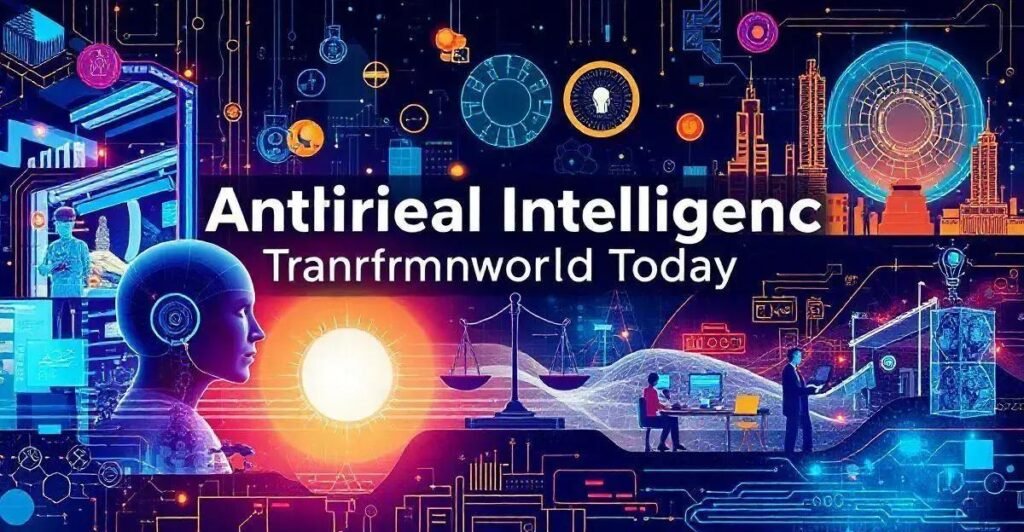As artificial intelligence advancements continue to shape our world, it’s crucial to explore the latest breakthroughs and trends.
From transforming industries to revolutionizing healthcare, AI is rapidly becoming an integral part of our daily lives.
With the potential to automate tasks, enhance decision-making, and create new job opportunities, AI is a technology that has the power to shape the future of humanity.
In this article, we’ll delve into the latest advancements in AI, exploring the benefits and challenges that come with this rapidly evolving technology.
Revolutionizing Healthcare with AI
Artificial Intelligence (AI) is transforming the healthcare industry by providing more accurate diagnoses, improving patient outcomes, and streamlining administrative tasks.
AI-powered chatbots are assisting patients with scheduling appointments, providing medical information, and even helping to diagnose conditions.
AI-driven predictive analytics are also helping healthcare professionals identify high-risk patients and prevent complications.
Innovative Applications
Additionally, AI-powered robotic systems are assisting with surgical procedures, providing more precise and minimally invasive treatments.
As AI continues to evolve, we can expect to see even more innovative applications in the healthcare sector, revolutionizing the way healthcare professionals work and patients receive care.
Transforming Industries with AI-Powered Automation

AI-powered automation is transforming industries by streamlining processes, improving accuracy, and reducing costs.
In manufacturing, AI-powered robots are taking over repetitive and hazardous tasks, allowing human workers to focus on higher-value tasks.
In customer service, AI-powered chatbots are assisting with routine inquiries, freeing up human customer service representatives to handle complex issues.
In finance, AI-powered algorithms
are analyzing vast amounts of data to make predictions and optimize investment decisions.
As AI continues to evolve, we can expect to see even more industries revolutionized by automation, leading to increased efficiency, productivity, and competitiveness.
The Future of Work: AI and Job Displacement
The future of work is rapidly changing with the rise of Artificial Intelligence (AI). While AI has the potential to bring about significant benefits, such as increased efficiency and productivity, it also poses a threat to certain jobs. According to a recent study, up to 45% of jobs in the United States are at high risk of being automated.
However, AI also creates new job opportunities, such as AI developers, data scientists, and AI trainers. To prepare for the future of work, it’s essential for workers to develop skills that are complementary to AI, such as critical thinking, creativity, and problem-solving.
Governments and educational institutions must also invest in retraining and upskilling programs to help workers adapt to the changing job market.
AI-Powered Cybersecurity: Protecting Your Digital World

Artificial Intelligence (AI) is revolutionizing cybersecurity by providing advanced threat detection, incident response, and predictive analytics.
AI-powered systems can analyze vast amounts of data in real-time, identifying potential threats and vulnerabilities before they can cause harm.
AI-driven security information and event management (SIEM) systems can also automate the process of identifying and flagging potential security threats, freeing up human security analysts to focus on more complex and high-priority tasks.
Additionally, AI-powered encryption techniques can ensure that sensitive data remains secure and confidential.
As AI continues to evolve, we can expect to see even more innovative applications in the field of cybersecurity, protecting our digital world from ever-growing threats.
The Impact of AI on Education: Opportunities and Challenges
Artificial Intelligence (AI) is transforming the education sector by providing personalized learning experiences, automating administrative tasks, and improving assessment and grading systems.
AI-powered adaptive learning systems can adjust the difficulty level of course materials to individual students’ abilities, providing a more effective learning experience.
Additionally, AI-driven natural language processing can help teachers identify students who may be struggling with a particular concept, allowing for targeted interventions and support.
However, AI also raises concerns about the potential impact on teacher jobs and the need for educators to develop new skills to work alongside AI.
As AI continues to evolve, it’s essential to strike a balance between the benefits and challenges to ensure that AI enhances the educational experience for students.
Ethical Considerations in AI Development

Ethical considerations are becoming increasingly important in the development of Artificial Intelligence (AI). As AI systems become more autonomous and decision-making, it’s essential to ensure that they are designed with ethical principles in mind.
For example, AI systems should be transparent and explainable, allowing users to understand how they arrive at certain decisions.
Additionally, AI systems should be designed to avoid biases and discrimination, ensuring that they treat all users fairly and equally.
Furthermore, AI systems should be developed with robust security measures to prevent unauthorized access and data breaches.
As AI continues to evolve, it’s crucial to prioritize ethical considerations to ensure that AI systems benefit society as a whole.
Frequently Asked Questions about Artificial Intelligence for Small Businesses
How can task automation benefit my small business?
Task automation frees up your team from repetitive tasks, increasing productivity and allowing them to focus on more strategic tasks.
What tools can I use for data analysis?
There are various tools available, such as Google Analytics, Tableau, and Microsoft Power BI, that help collect and interpret valuable data.
What are chatbots and how do they improve customer service?
Chatbots are virtual assistants that can answer questions and solve problems at any time, improving the customer experience and freeing up your team.
How can I personalize the customer experience?
Through data analysis, you can better understand customer preferences and offer personalized recommendations and promotions.
Why is customer feedback important?
Feedback is essential to identify areas that need improvement and adjust your service strategy, ensuring customer satisfaction.
Is artificial intelligence accessible for small businesses?
Yes, there are various AI solutions that are accessible and scalable for small businesses to improve efficiency and customer service.
